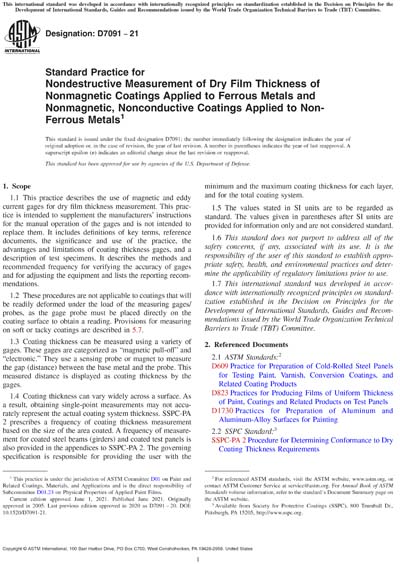Historical
ASTM D7091-21
Standard Practice for Nondestructive Measurement of Dry Film Thickness of Nonmagnetic Coatings Applied to Ferrous Metals and Nonmagnetic, Nonconductive Coatings Applied to Non-Ferrous Metals
1.1This practice describes the use of magnetic and eddy current gages for dry film thickness measurement. This practice is intended to supplement the manufacturers' instructions for the manual operation of the gages and is not intended to replace them. It includes definitions of key terms, reference documents, the significance and use of the practice, the advantages and limitations of coating thickness gages, and a description of test specimens. It describes the methods and recommended frequency for verifying the accuracy of gages and for adjusting the equipment and lists the reporting recommendations.
1.2These procedures are not applicable to coatings that will be readily deformed under the load of the measuring gages/probes, as the gage probe must be placed directly on the coating surface to obtain a reading. Provisions for measuring on soft or tacky coatings are described in 5.7.
1.3Coating thickness can be measured using a variety of gages. These gages are categorized as "magnetic pull-off" and "electronic." They use a sensing probe or magnet to measure the gap (distance) between the base metal and the probe. This measured distance is displayed as coating thickness by the gages.
1.4Coating thickness can vary widely across a surface. As a result, obtaining single-point measurements may not accurately represent the actual coating system thickness. SSPC-PA 2 prescribes a frequency of coating thickness measurement based on the size of the area coated. A frequency of measurement for coated steel beams (girders) and coated test panels is also provided in the appendices to SSPC-PA 2. The governing specification is responsible for providing the user with the minimum and the maximum coating thickness for each layer, and for the total coating system.
1.5The values stated in SI units are to be regarded as standard. The values given in parentheses after SI units are provided for information only and are not considered standard.
1.6This standard does not purport to address all of the safety concerns, if any, associated with its use. It is the responsibility of the user of this standard to establish appropriate safety, health, and environmental practices and determine the applicability of regulatory limitations prior to use.
1.7This international standard was developed in accordance with internationally recognized principles on standardization established in the Decision on Principles for the Development of International Standards, Guides and Recommendations issued by the World Trade Organization Technical Barriers to Trade (TBT) Committee.
ASTM International [astm]

